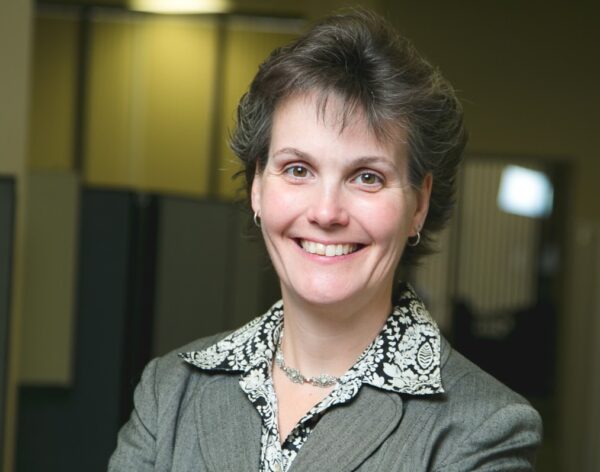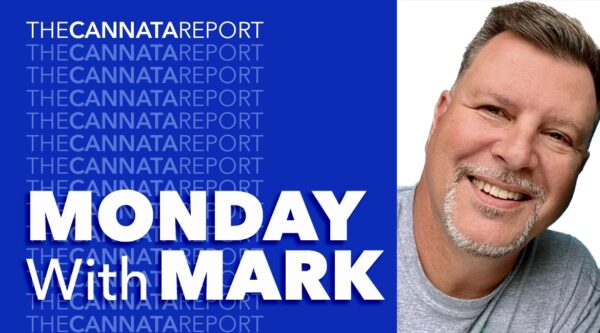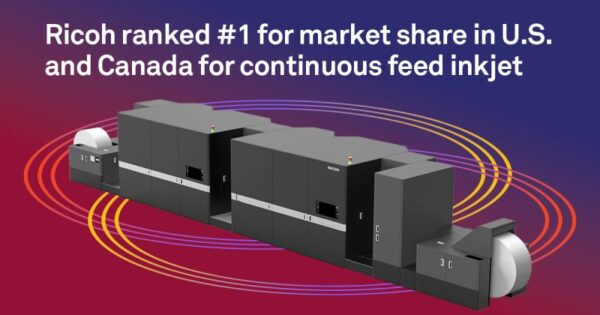Susie Woodhull and Jim Trick recap the Dayton, Ohio, dealership’s 70-year journey.
(Pictured above: Woodhull LLC’s leadership team, owner Susie Woodhull and President Bert Trick.)
The Cannata Report eased on down the virtual road, traveling to Dayton, Ohio, on July 23, for a visit with Woodhull LLC. Our hosts were owner Susie Woodhull and President Bert Trick, who offered a candid recap of all aspects of the business.
Woodhull LLC is a woman-owned business and single-line Ricoh dealer that primarily serves southwest Ohio from offices in Dayton and Cincinnati. A little more than a year ago, it expanded into central Ohio and now has an office in Columbus.
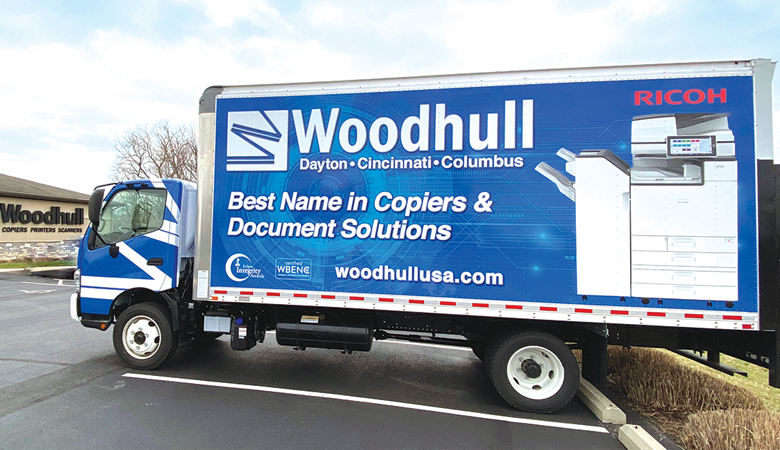
Above: Woodhull LLC serves customers in three Ohio markets: Dayton, Cincinnati, and Columbus.
The original Woodhull dealership was founded in 1950 by Susie’s father-in-law Jim Woodhull to sell SoundScriber dictation machines. After SoundScriber Corp. went bankrupt a few years later, Woodhull became a 3M dealer, selling its Thermo-Fax machines, one of the earliest photocopiers, as well as 3M audiovisual and microfilm products. By the early 1980s, it had expanded its offerings to include Ricoh copiers. Shortly after Woodhull partnered with Ricoh, 3M exited the copier business and sold its audiovisual division.
Culture Clash
In 1988, Susie’s husband Jay bought the business from his father. With a strong management team in place, including Susie, the vice president of service; Trick, vice president of sales; and Bill Kilker, chief financial officer, Woodhull was poised to grow.
As the company grew, it attracted the attention of Alco Standard, later to become IKON Office Solutions, which made an offer to Jay in 1996 that he couldn’t refuse. Selling the business sounded like a good idea at the time. Then came the culture clash.
“We tolerated that with a big capital T,” recalled Susie. “We were giving them an incredible bottom line profit of around 15%, but they didn’t value it.”
It was a culture not suited to independent entrepreneurs who had built a successful business only to find their years of knowledge and experience minimized. Despite this disconnect, the Woodhull team grew the business in the Dayton marketplace to $29 million over the next three years.
Yet, just as quickly, it was over. The Woodhull executive team was let go in 1999. Because Jay was the sole owner of the original company, his non-compete was longer than the rest of the executive team. In 2000, Susie acquired a Gestetner dealer, and with Trick and Kilker onboard, Woodhull was back in business. Over the next 20 years, the second iteration of Woodhull grew from nine employees and less than $1 million in revenue to 80 employees and $25 million in revenue.
The Woodhull Culture
Susie describes the Woodhull culture as family-oriented and customer-centric.
“We all try to swim in the same direction to take care of the customer,” said Susie. “We have high expectations. But we also enjoy having fun.”
Trick shares a different perspective.
“Susie truly is the culture of the company,” said Trick. “I don’t think we have an employee that doesn’t love and respect her. She sets the tone and the culture for the organization. Susie is the captain of the ship and has a huge heart. She treats everyone fairly. Our employees love working here. Even when they depart for greener pastures, they always say good things about the organization and Susie.”
“I work hard and people see that,” added Susie. “I try to lead by example. Generally, when somebody leaves, hopefully it’s not because they’re terminated. But even if that happens, I try to make sure they know I care about them and that I wish them well. We had a super sales gal leave last week. The next thing I know, she’s handing me a thank-you note.”
Ricoh Rocks
No relationship is perfect, but the love affair between Woodhull and Ricoh has endured. Susie and Trick credit their interactions with Ricoh team members, from its DSMs to its technical support people, to Vice President Dealer Division Jim Coriddi, for their long-time commitment to their technology and solutions partner.
“We have been treated extremely fairly by Ricoh and are nothing but pleased with the relationship,” said Trick. “We don’t see a need to pick up another line because the product line is strong from top to bottom.”
“A lot of dealers take on multiple lines in order to be able to pressure the relationship with their main manufacturer,” opined Susie. “We’ve taken a different approach and believe we can be more cost- effective with one manufacturer. We work hard at the relationship and are straightforward with each another.”
For the record, when Woodhull resumed operations in 2000, it was unable to sell the Ricoh brand because the company had plenty of distributors in the Dayton market. There was still a Ricoh connection with the Gestetner line, which was part of the Ricoh family. Woodhull later switched to Lanier, another Ricoh family brand. After COMDOC, a Ricoh dealer in the Dayton market, was acquired by Xerox in 2009, Woodhull could sell the Ricoh brand again.
Dealing with Diversification
For Woodhull, diversification starts with managed print services. Ricoh recognized the dealership as its top printer reseller in 2019, which Susie and Trick attribute to Woodhull’s vibrant MPS business.
Another area of diversification, albeit one that hasn’t been growing as rapidly as MPS, is software solutions. Woodhull sells Square 9, PaperCut, and DocuWare.
“I think this experience [the pandemic] is going to make digital documents take off more with our customers,” predicted Susie.
A new offering is thermal temperature scanners.
“It’s a door-opener and an exciting opportunity,” said Susie, who has spoken to dealers who claim to be making $50,000 to $100,000 a month selling them.
Woodhull was also the top-ranked Ricoh dealer in commercial imaging for the past two years. Commercial imaging focuses on scanning and digitizing documents. Ricoh handles the document scanning for Woodhull’s customers by scanning them at its Cleveland facility. Depending on the customer, Ricoh will return the physical files or destroy them. This is a big service for municipalities, court systems, government entities, and manufacturing firms who must keep documentation indefinitely.
“All we’re doing is bird-dogging,” said Trick.
If it is a serious opportunity, Woodhull enlists the services of a Ricoh commercial imaging expert. According to Trick, these represent $10,000 to $200,000 document scanning projects.
“We’ve been very successful in securing those opportunities,” said Trick. “Ricoh does a nice job and we get a little bit of a profit margin—20% to 25%—on those projects.”
Fever Pitch
Like every other dealer, Woodhull has been impacted by the COVID-19 pandemic and try as we might, we could not avoid discussing its impact on the company.
Prior to March, business was booming, growing at an 18% compounded growth rate year-over-year same as it has been since 2000. Woodhull was hiring and planning to expand its Dayton facility by adding 18,000 square feet. Then, the pandemic struck. The warehouse expansion was scaled back to 12,000 square feet. The reason for building a new warehouse is to keep up with lease returns, which represent a significant portion of the company’s overall business and eliminate the need to rent offsite warehouse space. Construction is currently taking place.
“One of the interesting things we found out is the warehouse never really goes below about 85% of capacity,” observed Susie. “There’s constant deliveries and pickups of lease returns.”
Hardware sales had fallen because of the pandemic to about 70% of what was projected for 2020. As of June, business was starting to pick up again.
“Our total revenues are hanging in,” reported Trick. “They’re only down 12.5%.”
Gross profit is down considerably more than that—20% to 25%—while black & white and color copy volume is down 33% to 36%. Those numbers are in line with what The Cannata Report is hearing from other dealers.
Meanwhile, the base is holding steady thanks to minimums on the service side of the business.
“That’s saving us,” said Susie. “The base is consistent compared with last year. But the overages are decimated.”
At press time, service calls were running about 40% to 50% of normal. Service techs used to do four to five calls a day, but now some only do two calls a day.
For dealers who are currently struggling more so than a Woodhull, Trick said it’s not the size of the business, but how they structure their business and what their philosophy is on how they run their business.
“The dealers that do not do minimums, that thought it was a great marketing strategy to bill per click, I think those dealers are taking a really big hit right now,” opined Trick.
While the executive team and a small core group of employees continued to work onsite throughout the pandemic, some employees were furloughed. It was a short furlough, however, and everyone was back by Memorial Day.
Susie spoke with as many employees as she could personally when furloughing them. At the end of the day when she got in her car to drive home, she lost it.
“I felt like I had let people down,” recalled Susie. “Of course, that wasn’t the case because it was out of my hands.”
In spite of the current environment, she still loves the business and the industry, but this has been a test.
“As long as you keep up with the changes in technology, you’ll be recession-proof. But the level of stress with this has been to the stretching point,” admitted Susie.
“It’s not dampened our spirits with the business or the industry,” noted Trick about the pandemic.
Talking about the Next Generation
Over the years, Woodhull has made two acquisitions, including the Gestetner dealer in 2000. The dealership is not adverse to more and will talk to anyone who will listen. As the business has grown, Woodhull has become an acquisition target again. But Susie is not selling.
“I just politely say I’m not interested,” said Susie. “Equity people, I don’t really return their calls. If I want to make money for somebody, I’ll make it for myself.” The next generation is waiting in the wings. Susie’s oldest son Robert is the dealership’s marketing manager. When Ricoh’s Jim Coriddi asked a few years ago how the company could help Woodhull, Susie’s recommendation was to help dealers like her with children in the business prepare them to become the next generation of leaders. Since then, Robert has been participating in the Ricoh DNA program, a one-year program that is sort of a think tank for operations, new products, and marketing.
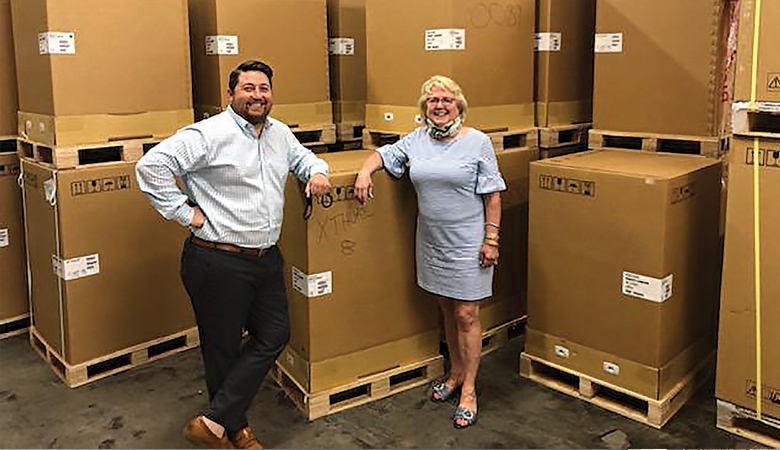
Above: Susie Woodhull with her son Robert who is being groomed to lead the company.
While Woodhull has a plan in place to keep the dealership sustainable, we were curious about what else they believe dealers need to do to remain sustainable.
Because the dealer side of the business is rooted in annuity streams, Trick feels that will continue to keep the business vibrant as he recalls the impact on Woodhull during the 2008 and 2009 recession.
“We do leases and we’ve bundled the service agreements in those leases, so it’s a nice annuity stream,” said Trick. “I don’t know if it’s pandemic proof, but 2008 and 2009 had a minimal impact on our business because of the way we do business.”
Perhaps new and improved business models will keep things sustainable. That’s why Susie wants to learn more about subscription-based models. She believes Ricoh and the other OEMs should be leading the way in educating their dealers.
“I don’t think that the subscription model has been figured out from an operational standpoint,” she said. “And it’s in such small bites. How’s that going to replace the click stream? I’d like [the OEMs] to be leaders in terms of saying here’s how we think you should sell it. You should sell it for a minimum of X, and so forth.”
The other model she’d like more insight about is seat-based billing.
“I don’t see the manufacturers jumping on that bandwagon and helping us figure that out,” she lamented. “Maybe that’s the best way to wrap in the subscription-based model.”
Susie’s questions illustrate why Woodhull is still doing business 70 years after the dealership was originally founded. As long as dealers like her continue to ask questions and look to expand their knowledge to help improve their dealerships, there’s no doubt as to the long-term sustainability of the independent dealer channel.
Access Related Content
Visit the www.thecannatareport.com. To become a subscriber, visit www.thecannatareport.com/register or contact cjcannata@cannatareport.com directly. Bulk subscription rates are also available.

